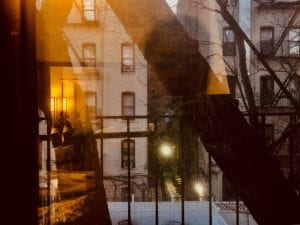Cynthia Davidson teaches “Writing the City,” an architecture seminar that introduces students to the importance of reading the city and writing in architecture. Topics in the class range from why you need to write, to how to write, to what to write. In this interview, she discusses how the virus has shifted her creative process and course curriculum. Also included are her thoughts on the importance of continually thinking, reading, and reflecting on the city outside your window.

Can you tell me a bit about your creative process?
My creative process begins with reading. I’ve always been a big reader—interested in ideas, stories, and histories. I’ve always thought that I have an attention deficit because I’ll start reading and then some idea will go off in my head and I’m lost in my own thoughts. I start thinking about what the author is saying, and that gives me an idea of something I want to write about or that I can argue with. I could present an alternative point of view or I could further that point of view.
And reading doesn’t necessarily begin with books. It can be the newspaper, it can be an email, it can be reading a facade of a building. Facades are forms for readings. My primary forms of reading are magazines, books and essays, like reading the New Yorker or small books. Robert Musil’s novel The Man Without Qualities is huge but so full of ideas for potential assignments that I can give to somebody else to write about when I’m thinking as an editor. For example, when I want to know more about something I’ll say, “hey Adriana, you know more about blogs than I do. Write to me about blogs.” So I would say reading is the genesis of my creative process.
How was your process changed by the Coronavirus?
What I am reading has been changed by the virus. I’m reading too much about the virus, number one. So that changes my creative process. I’m reading too many emails and media alerts. But I’m also just reading in general. You can tell simply by the changes that I’ve made in the syllabus since we’ve left Broadway. I think, oh, yes, Beatriz Colomina’s book X-Ray Architecture would be a great one to introduce now, or those first pages of Michel Foucault’s Panopticon essay, on the plague. My reading has become more scattershot. My creative process has been largely focused on the class I’m teaching, and ways to make it relevant and still stay on track with the idea of writing the city. But knowing that you’re trapped indoors most of the time, I have made it more reading heavy, precisely because for me the creative process does come from reading. And because I would love for everybody to understand that when they read they’re not just reading a story, or learning facts. They’re exposing themselves to new ideas and to new thinking. So I haven’t been doing any writing, I have to do some writing. And I will.
What are some positive takeaways associated with this shift to social distancing?
There are myriad pluses to this if one is thoughtful. First of all, the virus can affect anyone and everyone. There may be people who think they’re protected because they have money, but they’re really not. We all have to practice social distancing. There is something more egalitarian about it, on the surface or conceptually. Second, I think that it has made us more aware of both these economic differences and the disproportionate number of deaths in the African American population and in poorer populations. Whether we choose to do something about this I don’t know, I hope as a society we do. Third, and maybe this should be first, I think it’s a great moment to think about climate change and what its future impact could be. Social distancing has reduced the pollution caused by transportation and manufacturing. There’s been a lot written about how much cleaner the air is in China and India, in particular, where pollution is terrible and contributes to asthma and lung issues. What happens if we have a cleaner environment? What happens if we consume less? What happens if we only buy what we need instead of what we want? So many people are staying home right now and they all seem to want to make bread but we can’t all get yeast. All the sudden yeast is as precious as gold.
What is it that’s really important? If we learn anything from this moment it’s: what is it that we really need versus what is it that we would like to have? If we end up consuming a little less there will be an economic impact, but then the economy itself has to re-calibrate if we want to take care of climate issues. It’s a big problem, but this is a moment to step back and think about these issues and how we might tackle them moving forward. They’re not going to be solved overnight. It is a moment to be more philosophical. And read!
